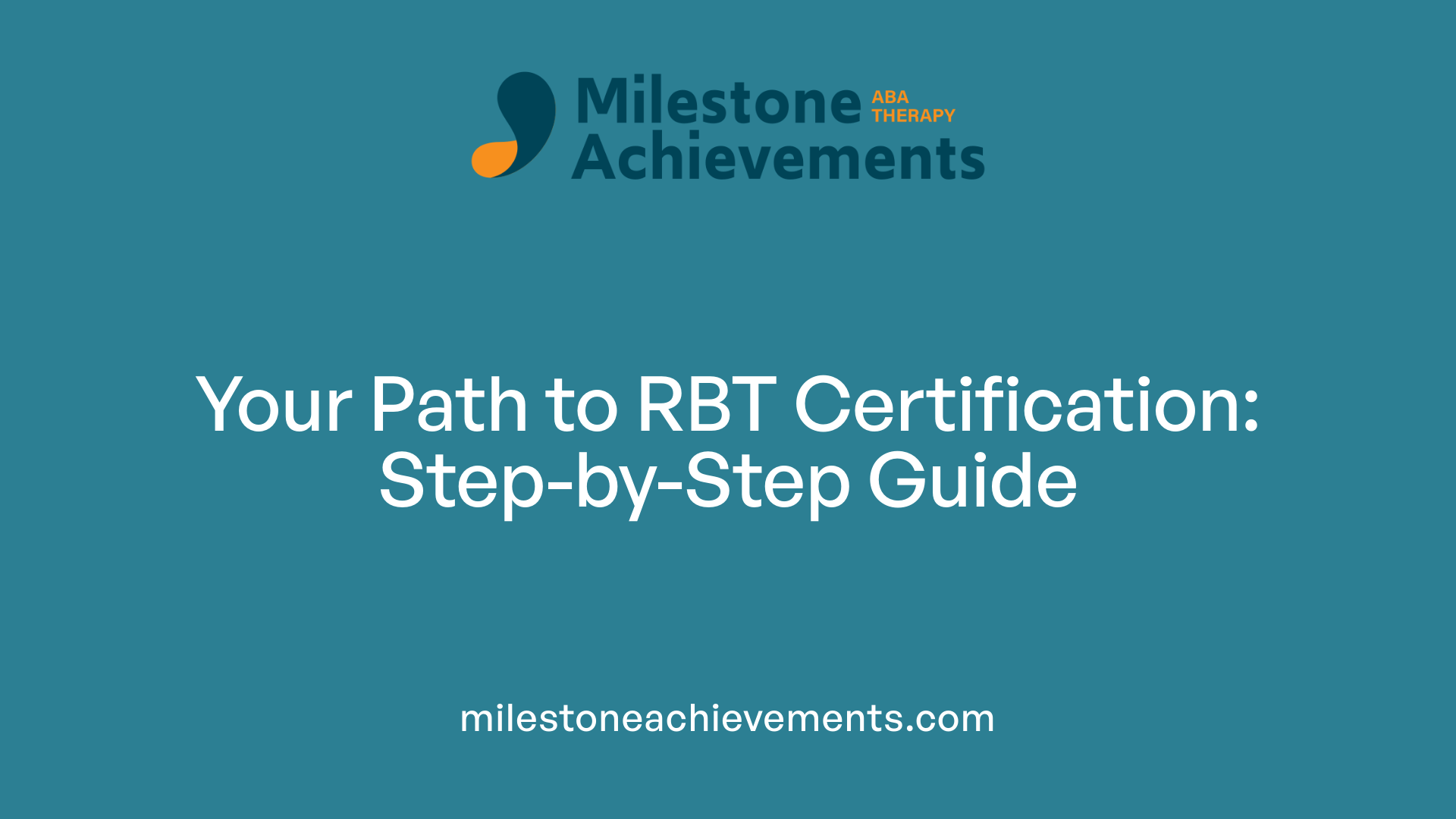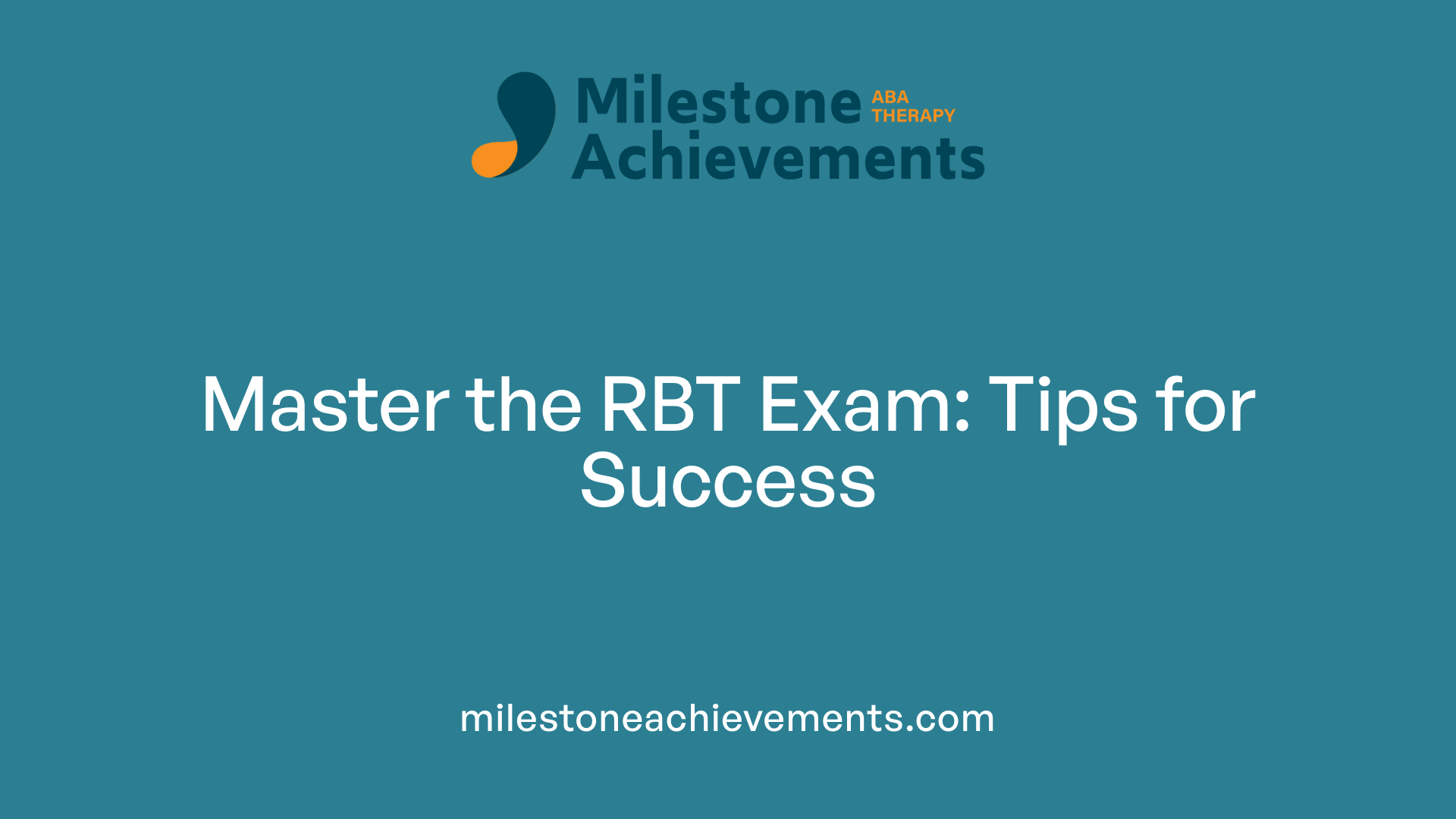
Steps to Obtain RBT Certification
Your Guide to Becoming a Registered Behavior Technician
Introduction to RBT Certification Steps
Achieving Registered Behavior Technician (RBT) certification is a structured process that requires understanding eligibility, completing training, passing assessments, and maintaining ongoing supervision. This article details the comprehensive steps involved, ensuring prospective candidates are well-informed and prepared for their journey to becoming certified in applied behavior analysis (ABA).
Understanding Eligibility Requirements for RBT Certification

What are the eligibility requirements for RBT certification?
To qualify for the Registered Behavior Technician (RBT) credential, applicants must meet specific initial criteria. First, they need to be at least 18 years old, ensuring they have the maturity needed for the role.
Next, possessing a high school diploma or its equivalent is necessary. This educational requirement ensures that candidates have foundational skills needed to comprehend training material.
Candidates are also required to undergo a criminal background check. This check must be completed within 180 days before applying to verify the individual's suitability for working with vulnerable populations.
In addition to these prerequisites, applicants must complete a 40-hour training course approved by the Behavior Analyst Certification Board (BACB). This training covers essential ABA concepts, professional ethics, data collection methods, and intervention strategies.
Once the training is finished, candidates must demonstrate competency through an assessment overseen by a BACB-certified professional, typically a BCBA or BCaBA. After passing this competency assessment, applicants are eligible to sit for the RBT exam.
The entire process from meeting eligibility to passing the exam typically takes between 3 to 6 weeks, depending on the individual's pace in completing training, assessments, and scheduling exam dates.
This structured process ensures that all prospective RBTs are well-prepared to deliver quality services aligned with professional standards.
The Step-by-Step Application Process

What is the step-by-step process to obtain RBT certification?
Getting Registered Behavior Technician (RBT) certification involves a series of well-defined steps. It begins with ensuring you meet the basic eligibility requirements. These include being at least 18 years old, holding a high school diploma or equivalent, and passing a criminal background check.
Next, you need to complete a 40-hour training course from a provider approved by the Behavior Analyst Certification Board (BACB). This training covers essential topics like ABA principles, ethics, data collection, and behavior intervention strategies. Typically, this course is offered online and includes assessments to ensure understanding.
Following your training completion, the next crucial step is performing an initial competence assessment. This evaluation must be overseen by a licensed BACB certificant, such as a BCBA or BCaBA, who will observe and verify your skills through direct tasks or role-play scenarios.
Once you pass the competency assessment, you can proceed with the application. This involves creating a BACB account, logging in, and submitting your application along with required documents like your training certificate, proof of competency completion, and a background check. You will also need to pay an application fee.
After your application is approved, the final step is passing the RBT exam. The exam contains 85 multiple-choice questions and tests your knowledge across various ABA topics, including measurement, assessment, skill acquisition, and ethics. Passing the exam completes your certification process.
Throughout this journey, organizations like Surpass Behavioral Health can support you with training resources, guidance, and preparation for each step. Completing all these stages successfully will allow you to practice as a certified RBT, provided you meet ongoing supervision and renewal requirements.
Training and Coursework Requirements
What training and coursework are required to qualify for RBT certification?
To become a Registered Behavior Technician (RBT), candidates must complete a structured 40-hour training program that aligns with the RBT Task List (2nd edition). This training forms the foundation of ABA (Applied Behavior Analysis) principles necessary for certification.
The curriculum covers important areas such as the basics of behavior analysis, ethical considerations, data collection methods, skill acquisition strategies, behavior reduction procedures, crisis management, and professionalism. This comprehensive training ensures that applicants are well-prepared for practical application in clinical settings.
Most training programs are delivered entirely online, allowing candidates to access modules at their own pace. These modules include interactive lessons, quizzes to reinforce learning, and a final exam. To successfully complete the training, learners must meet minimum standards, including scoring at least 80% on quizzes and the final assessment.
Following the completion of the coursework, applicants must undergo a competency assessment, typically conducted by a BACB-certified supervisor such as a BCBA or BCaBA. This assessment involves demonstrating practical skills and understanding by performing specific tasks directly with clients or in role-play scenarios.
In addition to the training and competency assessment, candidates need to meet other requirements, such as being at least 18 years old, possessing a high school diploma or equivalent, and passing a criminal background check. These steps, combined with passing the certification exam, culminate in obtaining the RBT credential.
The certification process ensures that all RBTs are properly trained and capable of delivering effective behavioral interventions, adhering to ethical standards, and maintaining professional competence.
| Step | Requirement | Details |
|---|---|---|
| 1 | Complete 40-hour training | Based on RBT Task List (2nd ed.), online modules, quizzes, exam |
| 2 | Demonstrate competency | Under supervision, performing 20 tasks, with at least 3 tasks directly with a client |
| 3 | Apply for certification | Submit documentation and fee to BACB |
| 4 | Pass the RBT exam | 85 multiple-choice questions at Pearson VUE |
| 5 | Maintain certification | Supervision, ethics adherence, annual renewal |
This structured pathway ensures all candidates are thoroughly prepared to uphold high standards of care and professionalism as RBTs.
Understanding the RBT Examination Process and Preparation Tips

How does the RBT exam work, and how can I prepare for it?
The RBT (Registered Behavior Technician) exam is a crucial step toward certification. It consists of 85 multiple-choice questions and must be completed within 90 minutes. The exam is designed to assess your knowledge across various areas outlined in the RBT Task List, which includes topics like measurement, assessment, skill development, behavior reduction, documentation, reporting, and professional conduct.
Before you can sit for the exam, you need to fulfill several prerequisites. These include completing a 40-hour training aligned with the RBT Task List, passing a competency assessment overseen by a BACB-certified professional, and submitting your documentation—such as proof of high school completion, a background check, and your training certificate.
Registration for the exam is handled through the Behavior Analyst Certification Board (BACB). The test is administered at Pearson VUE testing centers, or in some cases, online monitoring may be available depending on your location. The exam fee is $45, payable during the registration process.
Preparing effectively involves studying the entire RBT Handbook and familiarizing yourself with the exam content areas. Practice tests and sample questions are valuable tools, helping you become comfortable with the question format and timing. Many online courses provide mock exams and quizzes to aid your preparation.
If you do not pass on your first attempt, don’t worry. You are allowed up to eight retakes within a 12-month period. After each unsuccessful attempt, review your weak areas, and consider additional study or practice tests before retaking it.
Maintaining your certification also requires ongoing supervision and annual renewal, which means continuous learning and adherence to ethical standards. A thorough understanding of the exam process and diligent preparation can help ensure your success and advance your career as an RBT.
Cost Breakdown of the Certification Process
Obtaining Registered Behavior Technician (RBT) certification involves several costs, which can vary depending on the training provider and individual circumstances.
The initial expenses include the application fee, which is typically around $50. Candidates also need to pay a $45 fee for the certification exam, which is conducted at Pearson VUE testing centers. Background check costs add another layer, usually ranging from $30 to $60, to ensure candidate suitability.
Training costs are a significant part of the process. The required 40-hour course, based on the RBT Task List, can be accessed for free through some programs, or may cost anywhere from $100 to $300 if purchased from paid providers. This flexibility allows candidates to choose affordable or more comprehensive options.
Additional expenses include fees for competency assessments, generally between $50 and $150, which are conducted by qualified professionals to verify practical skills. Study materials, practice exams, or extra resources may also be purchased for $10 to over $50 to better prepare for the exam.
After certification, maintaining the credential involves renewal costs. An annual renewal fee of approximately $35 is standard. Continuing education units, necessary for renewal, can cost between $10 and $50 each, depending on the course or provider.
Candidates should also account for possible fees related to rescheduling or canceling exams if needed, typically ranging from $27 to $32.
Overall, the total costs for obtaining and maintaining RBT certification generally fall between $200 and $1,000. However, most individuals find their total expenditure to be between $100 and $400, especially when utilizing cost-effective training options.
| Cost Category | Typical Range | Additional Notes |
|---|---|---|
| Application fee | $50 | Paid to the BACB |
| Exam fee | $45 | Pearson VUE testing centers |
| Background check | $30 - $60 | States vary, check local requirements |
| Training course | Free - $300 | Based on provider; some free options |
| Competency assessment | $50 - $150 | Conducted by a BACB certificant |
| Study materials/exam prep | $10 - $50+ | Optional, for better exam prep |
| Renewal annual fee | $35 | To maintain certification |
| Continuing education units (CEUs) | $10 - $50 each | For renewal requirements |
| Rescheduling/cancellation fees | $27 - $32 | If exams are rescheduled or canceled |
This breakdown provides a clear overview of the various costs associated with becoming an RBT and helps candidates plan financially for the certification process.
Maintaining and Renewing RBT Certification

What are the requirements for maintaining and renewing RBT certification?
Once you become an RBT, maintaining your certification is an ongoing process that involves several important steps. The Behavior Analyst Certification Board (BACB) mandates that RBTs engage in continuous supervision and professional development.
One of the primary requirements is supervision. RBTs must receive supervision for at least 5% of their total work hours each month. This supervision can include face-to-face meetings or remote sessions, such as web-based supervision, ensuring consistent oversight and support.
In addition to supervision, RBTs are required to complete annual renewal procedures. This includes submitting proof of ongoing supervision hours, continuing education, and a renewal competency assessment. The renewal competency assessment must be conducted within 45 days of the certification’s expiration date.
The renewal process involves logging into the BACB online account, where practitioners submit their documentation. It is advisable to initiate renewal approximately 45 days prior to the expiration date to allow adequate processing time.
Failing to renew on time can have consequences. If renewal is delayed but within 30 days of expiration, an additional fee of $50 is required. If the renewal is more than 30 days late, reapplication and possibly a new competency assessment are necessary, which could extend the time before one can practice again.
Adherence to ethical standards and continuous professional competence are essential. These guidelines ensure that RBTs provide high-quality services while staying compliant with BACB regulations.
Below is a summary table highlighting the renewal requirements:
| Requirement | Details | Additional Notes |
|---|---|---|
| Supervision | At least 5% of work hours per month | Can include in-person or web-based supervision |
| Continuing Education | Ongoing training as per BACB standards | Focus on ethics, ABA principles, and client welfare |
| Renewal Competency Assessment | Completed within 45 days before expiry | Conducted by a qualified BACB supervisor |
| Renewal Application | Submit via BACB online portal | Initiate around 45 days prior to expiration |
| Late Renewal Penalties | $50 fee if within 30 days after expiration | Reapplication may be necessary after 30 days |
Remaining compliant with renewal requirements ensures continued certification validity, allowing RBTs to maintain their professional standing and continue to provide essential behavioral services.
Final Steps and Professional Considerations
Completing the steps to obtain RBT certification requires diligent preparation, adherence to guidelines, and ongoing professional development. Once certified, RBTs are responsible for continuous supervision, ethical practice, and regular renewal to ensure their credentials remain valid and their skills up to date. This structured process ensures that only qualified individuals deliver high-quality behavioral interventions, ultimately benefiting clients and advancing their careers in applied behavior analysis.
References
- Registered Behavior Technician (RBT) - BACB
- RBT Certification | Registered Behavior Technicians | Free Guide
- How to Become a Registered Behavior Technician (RBT)
- Registered Behavior Technician Training (Voucher Included)
- How to Become an RBT - Behavior Analyst Certification Board
- How to Become a Registered Behavior Technician
- How to Become Certified as a Registered Behavior Technician
- Behavior Technician Training - Florida Tech
- How To Become a Registered Behavior Technician RBT (3 Steps)


Partner with us on your child's journey
Milestone Achievements offers evidence-based ABA therapy to help children with autism reach their full potential. Together we’ll set meaningful goals and celebrate progress every step of the way.
Start ABA Services Today


